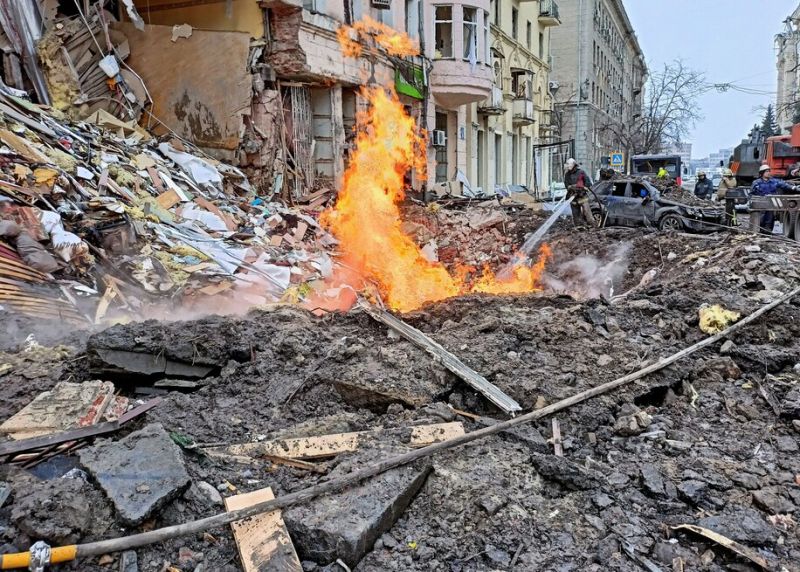
In parts of Ukraine that were relatively safe for the first three weeks of the war, the situation on the ground is deteriorating fast. In the Khmelnytskyi region, which sits astride the vital humanitarian and military supply route from Poland to Kyiv, relative quiet has given way in recent days to the sounds of exploding Russian missiles. As the war comes to his region, the governor there told me he has one urgent request for the West: Close the skies.
“We need to have a no-fly zone, that’s the most important thing, so the civilians will not be bombed”, Sergiy Gamaliy, the governor of Khmelnytskyi region, told me during an interview. “If that will happen, there will be nothing more to worry about. Everything else, Ukraine is able to withstand”.
Because of its central location, Khmelnytskyi has seen more than 300,000 refugees flow through over the past three weeks, Gamaliy told me. Some 50,000 are expected to stay there for the foreseeable future, most of them children or elderly people. The regional government is scrambling to provide for the elderly refugees’ care and keep the children safe while giving them activities and online education to ease their trauma in their new home.
Khmelnytskyi has also become a distribution hub for humanitarian aid flowing to several parts of Ukraine that are facing even worse conditions. Three hundred tons of humanitarian supplies have been processed in Khmelnytskyi since the war began, some coming from Europe and some from domestic sources. That’s probably why the Russian military has been attacking the provincial capital (and the airport) with missiles in recent days, the governor told me.
For Gamaliy, a no-fly zone means stopping not only attacks against civilians from Russian planes, but also closing the skies to missile and rocket attacks. Khmelnytskyi hasn’t been hit by Russian warplanes yet, but that’s likely only a matter of time. If the West wants to save aid and refugee hubs such as Khmelnytskyi, it had better institute a no-fly zone now, he said.
And if Russian President Vladimir Putin is permitted to bomb Ukraine into submission, Gamaliy said, Russia will surely not stop there. At that point, the West will be forced to intervene anyway, but at a greater disadvantage.
“The sooner they intervene, the easier it will be to stop Putin. The more Putin gets, the more difficult it will be to stop him from going further”, he said. “It’s wiser to intervene at this point, not after Ukraine falls”.
Of course, Khmelnytskyi is far from alone. On Sunday, a Russian missile attack on a Ukrainian military base near the Polish border killed dozens. The Russian military has expanded its missile strikes to the cities of Dnipro, Lutsk, Ivano-Frankivsk and others, while continuing its bombardment of Kyiv, Kharkiv and several cities in the south.
Gamaliy’s voice is hardly unique among Ukrainian leaders in calling on the West to establish some form of a no-fly zone in Ukraine. Ukrainian President Volodymyr Zelensky made the same plea in a video released Sunday: “If you don’t close our sky, it is only a matter of time before Russian rockets fall on your territory, on NATO territory”. Zelensky is expected to deliver a similar request when he gives a virtual address to Congress on Wednesday.
And although the Biden administration has said the idea is off the table, the White House has reversed itself on other initially ruled-out options, such as cutting off Russia’s oil exports, after political pressure mounted. There is some support in the foreign policy establishment for a “limited” no-fly zone, though the risks of escalation are certainly serious.
But Gamaliy argues that the West is inviting even more danger by not establishing a no-fly zone over at least part of Ukraine. And he sees the West’s hope that Putin will stop after conquering Ukraine as naive.
“This is the same thing the Western world thought 100 years ago, when they tried to appease Hitler”, he said. “It’s not just a fight between Russia and Ukraine. It’s a fight between Russia and the whole civilized world, the whole Western world. It is a fight for Western values”.
Gamaliy is right that appeasement always backfires when dealing with expansionist, militaristic dictators. But he also is smart not to count on the West to save his people from Putin’s cruel plans. His people are training every day to fight a Russian force that wants nothing less than to take over the country. He wants the West to know there is no way Ukrainians will ever stop fighting, even if they are abandoned by the world.
“We are a peaceful country, we are not attacking anyone. But we are always ready to protect ourselves”, he said. “It’s hard to tell if it will happen or not, but if it will happen, we will be ready. We will fight for every inch of our land”.
Josh Rogin is a columnist for the Global Opinions section of The Washington Post. He writes about foreign policy and national security. Rogin is also a political analyst for CNN. He is the author of the book Chaos Under Heaven: Trump, Xi, and the Battle for the 21st Century.
